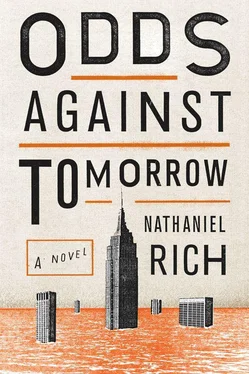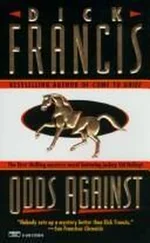The coverage of the heat wave and the drought, however exaggerated, seemed to contribute to the anxiety that had settled like a poisonous cloud over the country after Seattle. This worked to FutureWorld’s advantage. Nothing better prepared the mind for future fears than present anxieties. And so the ads were being clicked more frequently, and clients like Nybuster were discussing FutureWorld confidentially at midtown lunches, in Ivy League clubhouses, in Southampton swimming pools. More New Yorkers were beginning to wonder what the future might cost them.
On August 16, FutureWorld signed its fiftieth client. Charnoble mentioned that Brumley would be happy to consider a new office.
Mitchell’s mother — decent, homespun Rikki in Overland Park — fretted about him. She began to call more frequently.
“I’m just not sure it’s so healthy.”
“The scenarios, they’re a type of logic game. A puzzle.”
“These things you’re reading so much about — are you afraid of them actually happening?”
Mitchell bit his lip.
“No.”
Rikki snorted. She always could tell when he was full of it.
“You know your father still has nightmares about the revolution. I worry you’ve somehow inherited his fears.”
“Everyone has fears. It’s just a matter of controlling them. You must have fears yourself.”
“Of course I do. Senility. The Zukorminiums — what a job they’re doing on poor Tibor. And concern for my son’s well-being. That most of all.”
“So how do you overcome them?”
“I try to put them out of mind. Avoid a roving imagination and idle reveries.”
“I have a different strategy,” said Mitchell. He leaned back in his chair, his free hand gravitating to his head. The hair was getting thinner, it seemed. When he grabbed a fistful and pulled, several strands came away. Was this normal? The orphaned hairs collected on his desk. “I imagine a scenario in the greatest detail possible. That way I can figure out how unlikely it is to come true. Fearing the worst usually cures the worst.”
“You’re in New York now. You don’t have to deal with all the little indignities of small-town life. Or slumlord life. Everything is just so little here.”
“Sometimes I feel like a slumlord. Only the slums are inside me.”
“What?”
“Um, just that I feel—”
“Stop with the nonsense. Listen, you have a good job. You are your own man. You don’t have to be afraid of vast global tragedies that will not harm you. These scenarios are abstractions. Put yourself in the world. Be a person of action. Go outside. Take a walk in the park. I’m worried you’re burying yourself under books and charts.”
“A bomb on the crosstown bus would harm me,” said Mitchell passionately. “It would harm me a lot.”
He closed his eyes and saw bright sky, metallic dazzle. He was exhausted. An excess of fear did that to him. It exhausted his clients too. Nybuster lasted just over a month of meetings before losing his patience. By the end of August he had begun pacing around the room, nodding absently during Mitchell’s presentations.
“Be honest with me, Zukor. Nanobot invasions? Really?”
A look of concern flashed over Charnoble’s face, but by now he knew better than to interrupt.
“All right,” said Mitchell. “I will get into the heavy shit.”
“That’s what I wanted to hear,” said Nybuster. “Extreme terrorism? The bosses want to know more about that.”
Mitchell paused. He needed to try a new tactic with Nybuster. He remembered the street preacher on Lexington Avenue. There was something to that man’s act. The feverishness of it, the hot-blooded fantasy, the grand emotions. If a man attired in a brown canvas tunic cinched with string could make a living at it, then why couldn’t Mitchell? What did he have to lose? He counted silently to ten, then inhaled deeply.
“The End of Days.”
“And that would be?” said Nybuster, smirking.
“One day your employees start complaining about insomnia. Many of them call in sick. Those who do show up wear gloves in the office and never remove them. Why? you ask. They don’t respond.”
“Mm.”
“Show me your hands, you say. They refuse to show you. You physically force your secretary to remove her gloves. The gloves are filled with blood.”
“What?”
Charnoble was getting a look that Mitchell hadn’t seen since their first meeting together — a white sheet of paper passing over his face.
“You run her hands under the faucet,” Mitchell continued. “When the blood drains away, you can see the identical cuts on both her palms. The cuts are in the shape of a cross. You see what I mean.”
“Actually? I don’t.”
“She has received the stigmata.” He watched Nybuster closely for his reaction. It seemed to be taking. He thought of his father walking door-to-door in east Kansas City, selling the poor bastards on the merits of life in the Zukorminiums. So this is what it was to sell . Tibor hocked Zukorminiums; Mitchell hocked fear.
Charnoble busily screwed his fingernails into the palm of his hand. It appeared that he was trying to give himself a stigmata.
“The stigmata?”
“The stigmata. You see, your secretary is one of the chosen ones.”
“Chosen? For what?”
“You wake up the next morning to the sound of a trumpet call. The sun is turning black, like a rotten lemon. At the northern end of Broadway, seven horses appear in the middle of the avenue. They are as white as ivory. Astride the beasts are horsemen cloaked up to their eyes in dark canvas garments. The horses begin to march downtown.
“The East River has turned into blood. The Harlem into blood. The Hudson — also blood. Blood spurts out of the tap. There is a red ring around the shower drain. Blood comes out of there too.”
Nybuster was baffled. Baffled, but transfixed. Mitchell could tell what Nybuster was thinking: Where is this maniac going? What’s next? And that was the crucial question. As long as Nybuster wanted to know what happened next, the consultations would continue, and so would the referrals, the money, the information. The whole exhilarating cycle of doom.
“The blood is thick and dark, almost black,” said Mitchell. “It clots the pipes. Plants and crops start to wither. People raid supermarkets for bottled water. When that runs out, they start drinking the blood.”
Nybuster stared in wonder. Charnoble was pressing one hand over his mouth.
“The blood is nothing like normal human blood. It tastes awful.”
“Zukor? Are you all right? Alec, is he all right?”
“This taste,” said Mitchell, “this is the taste of the future.”
10.
The floor tiles in the bathroom were Florenza porcelain. The bathroom tiles were Verdana porcelain. The countertops in the kitchen were Caledonia quartz and Caesarstone quartz, and those beside the washer and dryer were Lacava polished marble. Mitchell didn’t know what any of this meant, but he figured that every proper noun could accurately be translated as “expensive.” The ceilings were nearly twice his height, and the floors were paneled with a white hardwood oak so pale that he periodically glanced behind him to see whether the soles of his shoes were leaving a trail, like a mud snail. But it was the living room — what just several months earlier, fresh from campus, he would have called a common room — that contained the apartment’s most astonishing feature: the windows. Only “windows” seemed too pedestrian. These were giant, luxurious, undulating sheets of glass, like fun house mirrors, only transparent. His broker, Pam Davenport, described them as “free-form,” which he could see was another way of saying “curved.” They spanned from the floor to the ceiling and were impossibly clean. You felt as if you were about to jump out of an airplane.
Читать дальше












